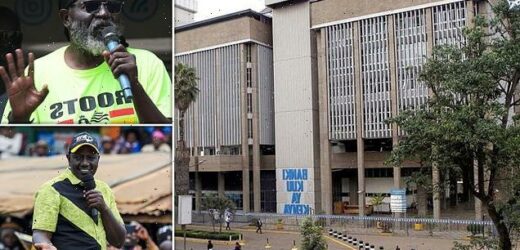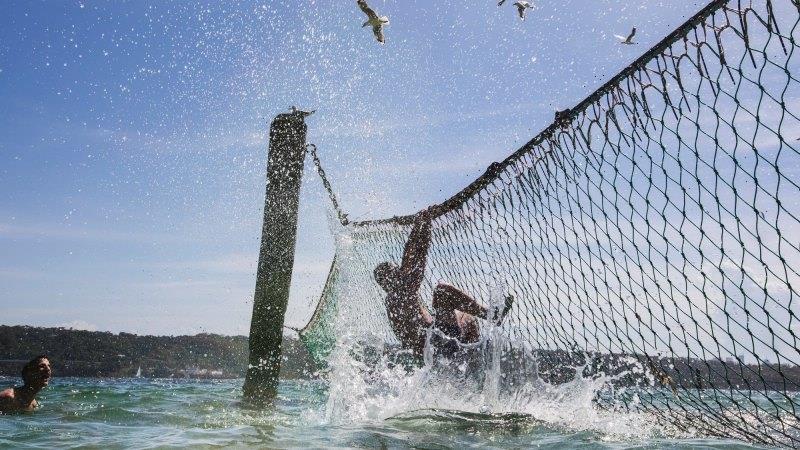Kenyan banks run out of small banknotes because politicians are bribing so many people, minister reveals
- Kenyans will elect a new president and thousands of officials on August 9
- But banks are said to be low on notes due to widespread campaign bribery
- Candidates with a lengthy history of corruption are standing for office
Kenyan banks are running out of small banknotes because politicians are bribing people to try to win their support for next month’s election, a government minister charged on Wednesday.
Politicians have been handing out small amounts of cash or other freebies to people who turn up to their campaign rallies ahead of the August 9 vote in a country where corruption is endemic.
‘You have seen people who are carrying money in bags, lining up citizens, giving them 200 bob (about 17 US cents),’ Interior Minister Fred Matiang’i said, using a slang term for the Kenyan shilling.
‘You have a shortage of 200-shilling notes in the banks and 100-shilling notes in your banks because politicians are bribing villagers,’ he told reporters at a briefing about money laundering and terrorism.
‘People are not working. They are standing on the roadside just to get 200 shillings from all these money launderers.’
The bribes are however an electoral offence punishable by a fine of up to two million shillings ($17,000) along with a potential six-year jail term.
Kenyan banks are running out of small banknotes because politicians are bribing people to try to win their support for next month’s election, a government minister charged on Wednesday (pictured: Central Bank of Kenya headquarters along Haile Selassie Avenue in Nairobi, Kenya)
Banners of Kenya’s opposition leader and presidential candidate Raila Odinga (L) and Kenya’s Deputy President William Ruto (R) are seen at the road side in Nairobi, Kenya, July 25, 2022
Kenya’s Deputy President and the Kenya Kwanza Coalition presidential candidate William Ruto (C), addresses a crowd of supporters at a political rally at Kangari town, Kigumo, in Muranga, Kenya, on 27 July 2022
Kenyans will next month elect not only a new president but also hundreds of members of parliament and about 1,500 county officials.
Candidates with a well-documented history of corruption are standing for various positions.
They include a member of parliament fined $7 million for corruption and handed a 67-year jail term; a top civil servant with an asset seizure order against her; lawmakers convicted of bribery, economic crimes and impersonating corruption investigators.
The government’s anti-graft watchdog, the Ethics and Anti-Corruption Commission (EACC), recommended that 241 candidates be disqualified from running, but only five were.
The election board declined to comment on individual cases but said the constitution only allows it to reject candidates on the basis of convictions if they have exhausted all avenues of appeal.
‘The politicians who crafted the constitution ensured they had a backdoor,’ said Phillip Kagucia, the EACC’s deputy director. ‘That backdoor leaves us vulnerable to unethical leadership.’
The EACC’s list of candidates that should be disqualified included 55 people charged with criminal offences, three with convictions and 11 under investigation.
Roots party Presidential candidate George Wajackoyah, gestures to his supporters during a campaign rally in Ruai, Nairobi on July 27, 2022, ahead of Kenya’s August 2022 general election
Supporters of Kenya Kwanza political party coalition flag bearer react as he arrives during a campaign rally in Mwea constituency, Kirinyaga county in Kenya’s central highlands on July 27, 2022
Others were accused of forging education certificates or not resigning from public office, a requirement to run.
The leading presidential candidates, Deputy President William Ruto and veteran opposition leader Raila Odinga, have both promised to crack down on corruption. But their promises ring hollow to many disillusioned Kenyans.
‘Corruption is a big issue,’ said Daniel Musau, a motorbike taxi driver in Nairobi.
‘It makes people not vote… We see so many who don’t have vote cards because of this issue of corruption.’
The election is seen as a key test for stability for East Africa’s biggest economy – two of its three last elections were marred by violence amid disputes over alleged rigging.
Sirisia Member of Parliament John Waluke attends a Azimio la Umoja One Kenya Alliance campaign rally in Kibera slums of Nairobi, Kenya June 5, 2022
Nairobi’s Governor Mike Sonko is escorted by police officers after his arrest at the Wilson airport in Nairobi, Kenya December 6, 2019
Among those allowed to stand is John Waluke, member of parliament for the rural western constituency of Sirisia. He is on bail pending appeal of a 2020 conviction for forging documents relating to a government contract to buy maize, for which he was sentenced to 67 years in jail and fined $7 million.
Waluke said he expected a ruling by October from the Anti-Corruption Court; if that goes against him, he plans to take his case all the way to the Supreme Court.
‘I was sentenced politically,’ he said.
Former Nairobi governor Mike Sonko – known for his flamboyant dress sense, chunky gold jewellery and impromptu rap videos – was among those prevented from running because he had been impeached.
He also faces criminal charges including conflict of interest, abuse of office, money laundering and conspiracy, which he denies.
Sonko’s lawyer George Khaminwa said they had lodged an application with the Supreme Court against his disbarment and would show his human rights were violated by not permitting him to stand.
Source: Read Full Article








